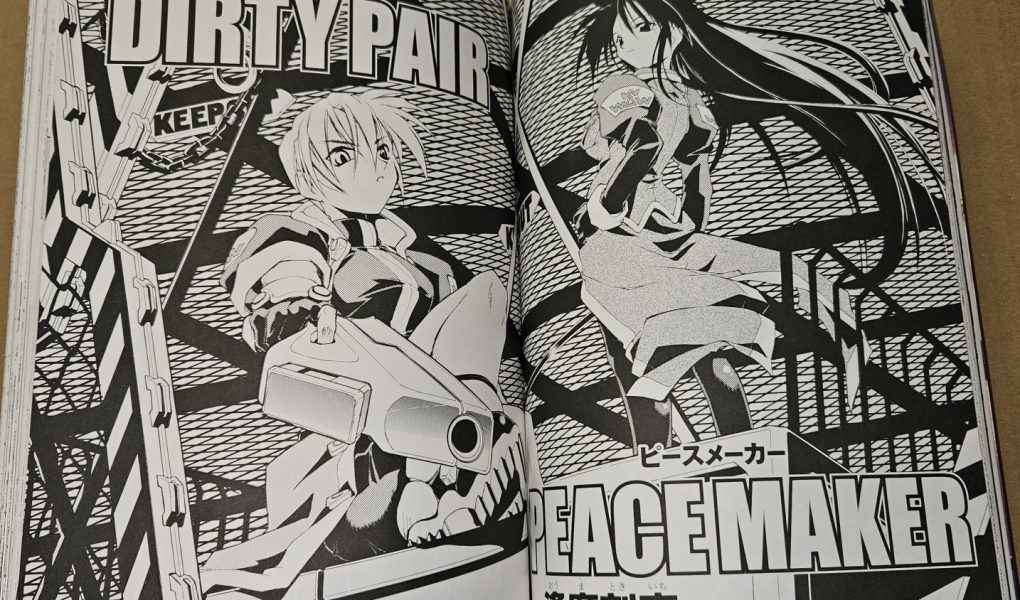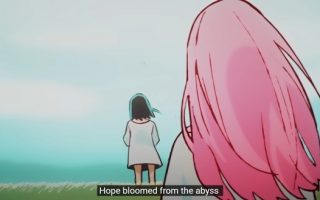The Lovely Angels, a pair of “trouble consultants” employed by the WWWA (World Welfare Works Association) are Kei & Yuri. They’re experts at their job, yet accidents, collateral damage, and disaster seem to coincidentally occur wherever they take action, leading to the girls earning the dreaded nickname “The Dirty Pair.” Author Haruka Takachiho seminal girls with guns series premiered as an illustrated prose story in the February 1979 issue of S-F Magazine. In March 1983 an anime feature film adaptation of Crusher Joe, another of Takachiho’s sci-fi novel series, hit Japanese movie theaters. In the ’83 Crusher Joe movie, the Joe team watch a drive-in movie. That movie features “The Dirty Pair,” marking Kei & Yuri’s first animated appearance. Two years after studio Nippon Sunrise animated Crusher Joe, the studio launched the 26-episode (24 broadcast episodes plus 2 OVA episodes) Dirty Pair anime television series in July 1985. The series was voted best anime production of 1985 by Animage Magazine readers, thus winning the year’s Animage Anime Grand Prix award, placing Dirty Pair in the company of other annual Anime Grand Prix award winners including Mobile Suit Gundam, Nausicaa of the Valley of Wind, My Neighbor Totoro, Pretty Soldier Sailor Moon, and Neon Genesis Evangelion.
Select episodes of the TV anime were adapted into manga form by Kazunari Ikeda and published in Monthly Shonen Magazine from June through November 1985.
The success of the ’85 Dirty Pair television anime rolled into the December 1985 release of the hour-long “Affair of Nolandia” OVA, a production more closely aligned to the tone and style of Takachiho’s original novels than the comical and satirical television series. The style of the television series anime resurrected in the November 1986 Dirty Pair Movie, widely known by its unofficial nickname “Dirty Pair: Project Eden.”
After a year hiatus, the Dirty Pair returned in a 10-episode OVA series that released from December 1987 through April 1988. After another short break, the pair returned to anime form again in January 1990 with the hour-long Flight 005 Conspiracy OVA.
Canadian translator Toren V. Smith’s translation firm Studio Proteus acquired rights to adapt The Dirty Pair. Smith on scripting and Adam Warren on illustration duty published their first original American Dirty Pair comic book in December 1988. The moderately successful series ultimately lasted 28 issues spread across six mini-series, an 8-page story originally published in the 1994 San Diego Comic Con Comics issue 3, and the “Start the Violence” story originally serialized in Dark Horse Comics Presents issues 132-134.
Although Haruka Takachiho continued to regularly publish Dirty Pair chapters that would be compiled into novels, the Lovely Angels in other media went dormant for four years before returning in the revamped reboot Dirty Pair Flash. The “Flash” redesign was a bit controversial among fans but ultimately proved successful enough to spawn three OVA series totaling 16 episodes, a single-volume manga adaptation by Hisato Makihara, and a single-volume “Dirty Pair Flash DX” manga story by Takemaru Ohno.
A 26-episode weekly streaming internet radio drama titled “Lovely Angel: Kei & Yuri” broadcast from October 1, 2006 until April 1, 2007. Reportedly the FM Osaka radio network’s “Itokubo Party Road” program included a weekly 10-minute Dirty Pair radio drama; however, I’ve been unable to pin down the year this series broadcast nor any other specific details about it.
FM Osaka also broadcast the “Dirty Pair 91: Kunoichi” radio drama on October 15, 2007. The two-hour broadcast consisted of two six-chapter stories written by Haruka Takachiho that reimagined Kei & Yuri as 18-year-old ninja in 1791 Japan. The broadcast was re-broadcast in April 2009.
The Dirty Pair resurrected in manga form once again in the “Great Adventure of Dirty Pair” manga by Hisao Tamaki published in Monthly Comic Ryu from May 2010 through July 2011.
The most recent official iteration of The Dirty Pair appeared from November 29 to December 26, 2022 in the form of the Alice Gear Aegis & Dirty Pair Collaboration “Glory to the Galactic Partners (Pairs)! ~A Lovely Maiden and a Captain Are in Action!!~.” 1985 television series character designer Tsukasa Dokite drew the new character designs for the smartphone game cross-over.
The Discovery
By random chance I stumbled across the existence of another practically lost iteration of The Dirty Pair, the short-lived “Dirty Pair Peace Maker” manga by Tokiichi Ouma. The November 2001 first issue of publisher Fujimi Shobo’s manga magazine Dragon HG contained a 9-page preview of Tokiichi Ouma’s cyberpunk action manga story. Dragon HG issues 2 & 3 contained the first and second chapters of the manga. Dragon HG issue 4 contains a single-page apology illustration by Ouma explaining that he didn’t finish the month’s chapter in time for publication. Issue 5 contains Dirty Pair Peace Maker chapter 3, which ends with the promise that the story will continue in the next issue, but Dragon HG Magazine ceased publication after only five issues.
Dirty Pair Peace Maker seems to be practically entirely forgotten. The Japanese-language Wikipedia page for Dirty Pair contains no mention of it. A Yahoo Japan search for “Dirty Pair Peace Maker” in katakana brings up no significant matches or images. For Dirty Pair fans, the existence of Dirty Pair Peace Maker may be another novel footnote yet little more. The story appears to be a rather humorless straightforward sci-fi action story in which the Lovely Angels foil a villain attempting some sort of heist using a mecha tank. But in stopping the rampaging robot, cryogenic capsules containing three young girls get broken open. In a nod to Akira, the three girls are espers with monstrous, uncontrollable psychic power which they use against soldiers in a bloody massacre. The Dirty Pair have to clean up their mess by subduing and capturing the rogue girls. Kei & Yuri do succeed in beating up and apprehending the trio but seem frustrated over the way the children had been mistreated in the first place.
In Dirty Pair Peace Maker, Kei & Yuri are redesigned although Kei still has short hair while Yuri has long, straight hair. Kei relies on laser pistols while Yuri’s weapon of choice appears to be a long baton or sword that doubles as a whip. The girls also distinctly cover up, ditching their classic bikini uniforms. Both agents appear to be skilled hand-to-hand martial arts. Their WWWA supervisor in this iteration is female. The stylistic tone of the manga story feels indebted to the distinctive tone of late 90s and early 2000s sci-fi action anime including AD Police, DT Eightron, Generator Gawl, and Chouja Reideen that all featured spindly character designs and narrow, thin lines in their art design.
As far as I can tell, like Kazunari Ikeda’s original 1985 manga, Tokiichi Ouma’s Dirty Pair Peace Maker has never been reprinted and, in the 23 years since its publication, has become even more obscure than Ikeda’s 1985 manga. However, given its execution and short length, Dirty Pair Peace Maker seems more like a trivial novelty for hardcore Dirty Pair fans to seek out than a lost treasure to be rediscovered and re-evaluated.
On a side-note, Dragon HG issue 1 also contains the first and only manga appearance of Kenichi Sonoda’s very short-lived Wrestloid Baby project. The 8-page “Wrestloid Baby Prologue” manga story first published in Dragon HG issue 1 was later reprinted in the Sonoda Kenichi Shoki-tan manga anthology.




